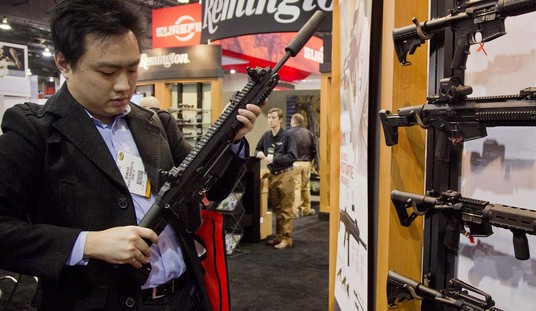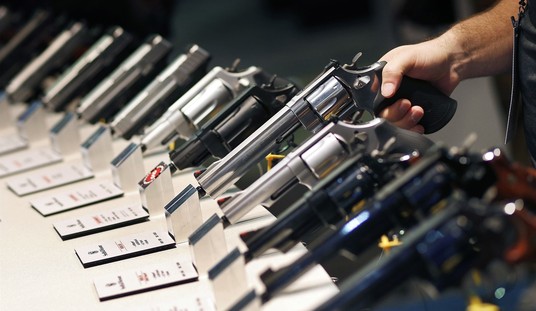What exactly is a “large capacity” magazine? Well, it depends on who you ask, and where. According to California, it’s any magazine that can accept more than ten rounds. In Colorado it’s a magazine that can hold more than 20 rounds. And in Massachusetts, gun control activist John Rosenthal and a coalition of prohibitions are demanding Congress enact a ban on both “assault weapons” (another invented term with no fixed definition beyond “gun I want to ban”) and “large capacity” magazines that can accept more than five rounds.
In an op-ed at the Boston Globe, Rosenthal and his fellow signatories contend that since “hunters are required to obtain a state license and the number of round they can carry in their hunting rifles is limited,” there’s no reason why those same limitations shouldn’t apply to all firearms, whether they’re used for hunting or for self-defense. In making his case, however, Rosenthal also simply makes up an opinion by the late Justice Antonin Scalia that’s nowhere to be found in the Supreme Court’s Second Amendment jurisprudence.
As law enforcement officers, survivors of gun violence, gun owners, policy makers, public health workers, faith leaders, businesspeople, and union members, we respect and support the Second Amendment right to keep and bear arms. However, as Supreme Court Justice Antonin Scalia wrote in the 2008 District of Columbia v. Heller ruling, “Like most rights, the Second Amendment right is not unlimited. It is not a right to keep and carry any weapon whatsoever in any manner whatsoever and for whatever purpose.”
Scalia further noted that present-day military-style assault weapons did not exist at the time of the nation’s founding and are not protected by the Second Amendment. He stated that “nothing in our opinion should be taken to cast doubt on longstanding prohibitions on the possession of firearms by felons and the mentally ill, or laws forbidding the carrying of firearms in sensitive places such as schools and government buildings, or laws imposing conditions and qualification on the commercial sale of firearms.”
Not only did Scalia never say that “military-style assault weapons” did not exist at the time of the Founding and aren’t protected by the Second Amendment, the Supreme Court has repeatedly held that “The Second Amendment extends, prima facie, to all instruments that constitute bearable arms, even those that were not in existence at the time of the founding”; first in the Heller decision in 2008 and again in Caetano v. Massachusetts in 2016, when the Court rejected the state of Massachusetts’ ban on stun guns. A unanimous Court opined:
The court offered three explanations to support its holding that the Second Amendment does not extend to stun guns. First, the court explained that stun guns are not protected because they “were not in common use at the time of the Second Amendment’s enactment.” Id., at 781, 26 N. E. 3d, at 693. This is inconsistent with Heller’s clear statement that the Second Amendment “extends . . . to . . . arms . . . that were not in existence at the time of the founding.” 554 U. S., at 582.
The court next asked whether stun guns are “dangerous per se at common law and unusual,” 470 Mass., at 781, 26 N. E. 3d, at 694, in an attempt to apply one “important limitation on the right to keep and carry arms,” Heller, 554 U. S., at 627; see ibid. (referring to “the historical tradition of prohibiting the carrying of ‘dangerous and unusual weapons’ ”). In so doing, the court concluded that stun guns are “unusual” because they are “a thoroughly modern invention.” 470 Mass., at 781, 26 N. E. 3d, at 693–694. By equating “unusual” with “in common use at the time of the Second Amendment’s enactment,” the court’s second explanation is the same as the first; it is inconsistent with Heller for the same reason.
Finally, the court used “a contemporary lens” and found “nothing in the record to suggest that [stun guns] are readily adaptable to use in the military.” 470 Mass., at 781, 26 N. E. 3d, at 694. But Heller rejected the proposition “that only those weapons useful in warfare are protected.” 554 U. S., at 624–625.
For these three reasons, the explanation the Massachusetts court offered for upholding the law contradicts this Court’s precedent. Consequently, the petition for a writ of certiorari and the motion for leave to proceed in forma pauperis are granted. The judgment of the Supreme Judicial Court of Massachusetts is vacated, and the case is remanded for further proceedings not inconsistent with this opinion.
Rosenthal’s entitled to his own opinion, but he doesn’t get to create his own set of facts, and the fact that the Globe‘s editorial team let that nonsense stand is a sign that the paper’s editors either are completely oblivious to what the Court has actually said or they’re intentionally trying to misinform their readers in an attempt to drum up support for a gun and magazine ban.
It’s also worth noting that nowhere in Rosenthal’s missive does he limit that magazine capacity to detachable magazines. Based on his writing, Rosenthal and his fellow prohibitionists want to outlaw not only standard magazines used in semi-automatic handguns and long guns, but even commonly-owned rifles with fixed magazines… and perhaps even six-shot revolvers as well.
One other thing worth noting: at no point does Rosenthal ever get around to stating what he thinks the punishment should be for possessing an illegal “assault weapon” or one of those ten-round magazines. Does he think this should be a misdemeanor offense punishable by a fine and a small amount of jail time or a federal felony subject to five, ten, or twenty years in prison? I have no idea, because like the vast majority of anti-gun proposals the activists would much rather talk about putting a law on the books instead of how and when it will be enforced.
I don’t think Rosenthal’s request is going to get far on Capitol Hill, but given the number of Massachusetts state lawmakers who’ve signed on I can’t say the same for Beacon Hill. With lawmakers already taking aim at legal gun owners in a massive omnibus bill, don’t be surprised if that legislation is amended to include the five-round limit that Rosenthal is demanding nationwide; turning the vast majority of the state’s lawful gun owners into criminals while failing to address the repeat offenders that have made Massachusetts the New England state with the highest rates of violent crime.









Join the conversation as a VIP Member